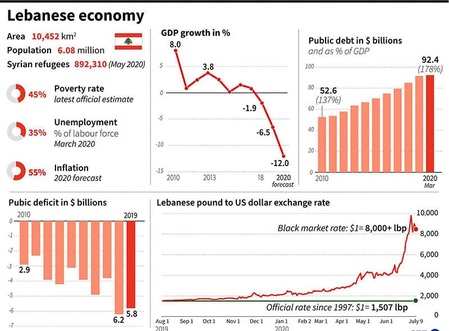Lebanon's Economic Collapse in Numbers

Lebanon is battling its worst economic crisis since the 1975-1990 civil war. The national currency is in freefall, while poverty and unemployment are on the rise.
Here are some numbers:
Plummeting pound
The Lebanese pound has lost around 90 percent of its value against the dollar on the black market in 18 months of crisis.
While the currency remains officially pegged to the greenback at 1,507 Lebanese pounds, the exchange rate has shot up to around 15,000 on the black market.
Poverty
Some 55 percent of Lebanese live below the poverty line of 3.84 dollars a day, the United Nations says.
Up to 23 percent of Lebanese live in extreme poverty, compared with just eight percent in 2019.
Inflation
Consumer prices rose by almost 146 percent during 2020, official statistics show.
Food prices overall rose by more than 400 percent last year, the World Food Programme says.
The price of a basket of key survival items such as rice, pasta and cooking oil has almost tripled since October 2019, the WFP says.
The price of subsidised bread has risen by 91.5 percent since May 2020, as the cash-strapped government has gradually increased the price of a large packet of flatbread while also diminishing its weight.
The price of meat has increased by 110 percent over the past year, while the cost of chicken has risen by 65 percent, the World Bank says.
Median salary
Before the economic crisis broke in 2019, the median salary in Lebanon was more than 950,000 Lebanese pounds, official statistics show.
While that salary was worth around $630 dollars before the crisis, its value on the black market on Tuesday was just $63.
Unemployment
In late 2020, unemployment stood at 39.5 percent.
From 2019 to 2020, full-time employment dropped by 40 percent in the construction sector, while it fell by 31 percent in the hotel and restaurant sector, the United Nations says.
Aid
A World Bank loan of $246 million is to provide aid to around 786,000 hardest hit Lebanese.
Recession
Lebanon's gross national product fell by 25 percent last year, the International Monetary Fund says.
Debt
Public debt reached $95.6 billion in late 2020, the country's third largest lender, Byblos Bank, says.
That is equivalent to 171 percent of GDP, the International Monetary Fund says.
Foreign currency reserves
On March 15, the central bank had $17.5 billion in reserves, its website said, even if analysts have alleged the figure is likely lower.
At the end of February 2020, it had stood at $30.3 billion, Byblos Bank analysts said, explaining the drop was mainly due to spending on subsidies including wheat and fuel.
Trade deficit
Lebanon's balance of payments deficit reached $10.2 billion by the end of November 2020, almost double that registered a year before, central bank statistics showed, according to a report by top lender Bank Audi.
Electricity
The government has spent $40 billion on the power sector since 1992, accounting for 40 percent of public debt, a report by the American University of Beirut has said.
Yet the state utility covers only 63 percent of electricity demand, which results in rolling blackouts, a December study by the AUB said.
Now just two weeks remain before a nationwide blackout unless emergency funding is secured to buy fuel oil to operate power plants, the caretaker energy minister has warned.
Coronavirus
Even as it battles with economic crisis, Lebanon has recorded at least 418,448 Covid-19 cases since early last year, 5,380 of them fatal.
Port explosion
A massive explosion at Beirut port last year killed more than 200 people and ravaged swathes of the capital.
It caused between $6.7 billion and $8.1 billion in damage and economic losses, the World Bank said.
Refugees
Lebanon's more than six million inhabitants include around 1.5 million Syrians who have fled war in their homeland, of whom almost one million have been registered as refugees with the United Nations.
Nine out of 10 Syrian refugee families in Lebanon live in extreme poverty, the UN says.
Nearly 180,000 Palestinians also live in Lebanon, according to an official census.
In a May 2020 survey, 80 percent of respondents said they had lost their job or seen their salary reduced, the UN agency for Palestinian refugees said.
See this economic collapse happened overnight and the strong president was not aware of it although he has been strong and president since 2016:)! He and his party with its 30 member parliamentary block and 10 ministers in every cabinet were not allowed to do any work or reforms they wanted to do. Take the electricity file; the president's party and his son in law have been in charge of it for the last 11 years and back in 2013 we were promised by Bassil to have 24/7 electric supply. But again, he was not allowed to perform and he had to rent Power ships and earn a commission of $350 million per year.
ستغرب أحد السفراء البارزين سؤال احد زواره عن اسباب عدم زيارته الرئيس عون فأجاب: ما الفائدة من زيارته؟ سيناريو اللقاءات بات معروفا لدى الجميع، فالقسم الاول من اللقاء يبدأ بتحميله اتفاق الطائف مسؤولية نزع صلاحيات الرئاسة، لينتقل الحديث بعد ذلك الى دوره الوطني وجهد جبران باسيل في الدفاع عن حقوق المسيحيين والشراكة الوطنية، وصولا الى التذكير بموقفه المبدئي من ترشيح الحريري "اللي ما بدو يشكل حكومة وانا اللي رديتو من السعودية" وانتهاء بتحميل الآخرين مسؤولية الانهيار الاقتصادي نتيجة التراكمات الموروثة منذ أكثر من ثلاثين عاماً.



